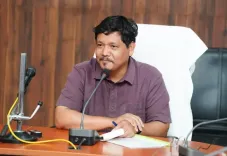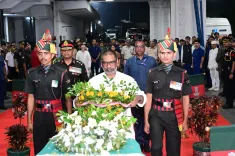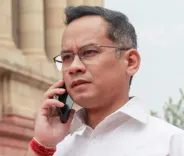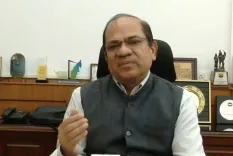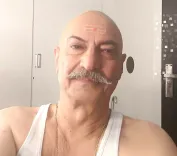Supreme Court dismisses petition for FIR on cash found at judge's residence

Synopsis
Key Takeaways
- The Supreme Court dismissed a plea for an FIR regarding burnt cash found at a judge's residence.
- An ongoing 'in-house' inquiry may lead to an FIR based on findings.
- The petition raised concerns over potential cover-up attempts by authorities.
- Justice Varma stated the cash is not his and expressed surprise at the situation.
- The case raises questions about judicial accountability and corruption.
New Delhi, March 28 (NationPress) The Supreme Court has on Friday dismissed a petition that sought a directive for the Delhi Police to file an FIR and conduct a thorough investigation regarding allegations of a significant amount of burnt cash being found at the official residence of Justice Yashwant Varma of the Delhi High Court.
"The ongoing 'in-house' inquiry is in progress. If the findings indicate any wrongdoing, an FIR may be mandated, or the issue could be referred to Parliament. This is not the appropriate moment to discuss the registration of an FIR," stated a bench led by Justice Abhay S. Oka, addressing advocate Mathews J. Nedumpara, the petitioner.
The Bench, which also included Justice Ujjal Bhuyan, remarked that post the committee's report submission, various avenues may be available for the Chief Justice of India (CJI).
"At this moment, it would be unsuitable to entertain this petition. There are broader requests for reconsidering some past judgments of this Court. We believe this is not the time to delve into that matter. Subject to the observations made, the petition is disposed of," the apex court ordered.
Previously on Wednesday, CJI Sanjiv Khanna declined to expedite the hearing when the petition was mentioned for urgent consideration.
CJI Khanna advised the individual litigant against making public statements, asserting that the registry would schedule the petition in due course.
Challenging the delay in FIR registration on March 14, the day unaccounted cash was allegedly discovered after the fire brigade attended to Justice Varma's residence to extinguish a fire, the petition alleged that the authorities’ delay in releasing electronic records suggests an attempt at a cover-up.
"Why were there no arrests made? Why was the cash not confiscated? Why was no mahazar prepared? Why was the criminal law not enacted? Why did it take nearly a week for the public to learn about this scandal? Justice Varma claimed that the cash does not belong to him, and he was completely taken aback by the situation. If that is the case, why did he not report to the police and request the registration of an FIR for a false implication?" the petition further questioned.
"This situation is straightforward. It points to the existence of illicit funds acquired through the sale of justice. Even assuming Justice Varma's explanation is credible, the lingering question is why he failed to file an FIR. Timely filing of an FIR is crucial for the police to investigate any conspiracy involved," the plea stated.
In the matter of Justice Yashwant Varma, there has been no FIR filed to the petitioners' knowledge. The public perception suggests that efforts will be made to obscure the issue, and initial statements about the cash recovery are now being contradicted.
Moreover, the petition sought to declare the three-member panel established by the SC Collegium as lacking jurisdiction to investigate the incident, arguing it constitutes various cognizable offenses under the Bharatiya Nyaya Sanhita (BNS).
The petitioners asserted that corruption within the judiciary significantly and directly violates the fundamental rights enshrined in Part III of the Constitution, empowering them as citizens to directly petition the SC.
The plea also challenged the ruling of a five-judge Constitution Bench in the K. Veeraswami vs. Union of India case, which stated that no criminal case should be initiated against a High Court judge, Chief Justice of a High Court, or a Supreme Court judge without consulting the CJI.
"This court's observation is rendered without due consideration, ignoring legal principles and unwittingly, without acknowledging that the police have a statutory obligation to file an FIR upon receiving information of a cognizable offense. This direction essentially restricts the police from fulfilling their statutory duties," it argued.
The plea contended that such a directive creates a special category of judges shielded from criminal laws, hindering FIR registration even in offenses involving POCSO.
Following the alleged discovery of cash, which sent ripples through the judicial community, CJI Khanna established a three-member committee to investigate allegations against Justice Varma and instructed the Chief Justice of the Delhi High Court to refrain from assigning him any judicial responsibilities for the time being.
According to a statement from the Supreme Court, CJI Khanna has constituted a committee comprising Mr. Justice Sheel Nagu, Chief Justice of the High Court of Punjab and Haryana, Mr. Justice G.S. Sandhawalia, Chief Justice of the High Court of Himachal Pradesh, and Ms. Anu Sivaraman, Judge of the High Court of Karnataka, to investigate allegations against Mr. Justice Yashwant Varma, a sitting judge of the Delhi High Court.
On Monday, D.K. Upadhyaya, Chief Justice of the Delhi HC, suspended judicial duties assigned to Justice Varma until further notice. Later, the SC Collegium, led by CJI Khanna, recommended that the Center repatriate Justice Varma to the Allahabad High Court. However, the Center has yet to act on the Collegium's recommendation.
In the meantime, numerous leaders from various bar associations have urged CJI Khanna and senior judges of the Supreme Court Collegium to retract the transfer of Justice Varma to the Allahabad High Court.

